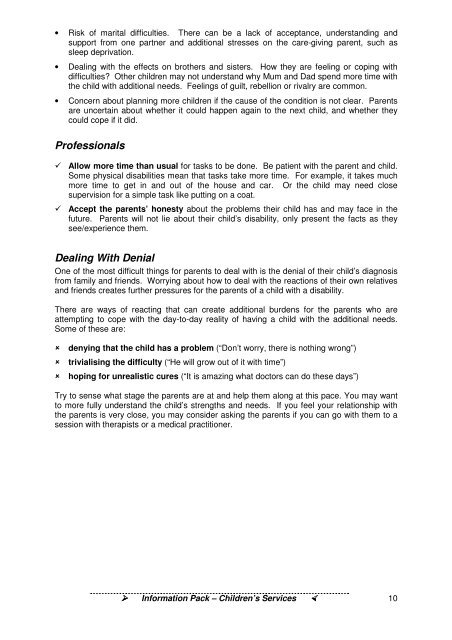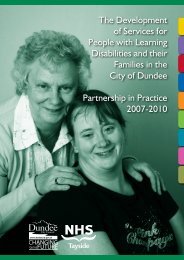Information for Parents and Carers of Children with - Dundee City ...
Information for Parents and Carers of Children with - Dundee City ...
Information for Parents and Carers of Children with - Dundee City ...
You also want an ePaper? Increase the reach of your titles
YUMPU automatically turns print PDFs into web optimized ePapers that Google loves.
• Risk <strong>of</strong> marital difficulties. There can be a lack <strong>of</strong> acceptance, underst<strong>and</strong>ing <strong>and</strong><br />
support from one partner <strong>and</strong> additional stresses on the care-giving parent, such as<br />
sleep deprivation.<br />
• Dealing <strong>with</strong> the effects on brothers <strong>and</strong> sisters. How they are feeling or coping <strong>with</strong><br />
difficulties? Other children may not underst<strong>and</strong> why Mum <strong>and</strong> Dad spend more time <strong>with</strong><br />
the child <strong>with</strong> additional needs. Feelings <strong>of</strong> guilt, rebellion or rivalry are common.<br />
• Concern about planning more children if the cause <strong>of</strong> the condition is not clear. <strong>Parents</strong><br />
are uncertain about whether it could happen again to the next child, <strong>and</strong> whether they<br />
could cope if it did.<br />
Pr<strong>of</strong>essionals<br />
Allow more time than usual <strong>for</strong> tasks to be done. Be patient <strong>with</strong> the parent <strong>and</strong> child.<br />
Some physical disabilities mean that tasks take more time. For example, it takes much<br />
more time to get in <strong>and</strong> out <strong>of</strong> the house <strong>and</strong> car. Or the child may need close<br />
supervision <strong>for</strong> a simple task like putting on a coat.<br />
Accept the parents’ honesty about the problems their child has <strong>and</strong> may face in the<br />
future. <strong>Parents</strong> will not lie about their child’s disability, only present the facts as they<br />
see/experience them.<br />
Dealing With Denial<br />
One <strong>of</strong> the most difficult things <strong>for</strong> parents to deal <strong>with</strong> is the denial <strong>of</strong> their child’s diagnosis<br />
from family <strong>and</strong> friends. Worrying about how to deal <strong>with</strong> the reactions <strong>of</strong> their own relatives<br />
<strong>and</strong> friends creates further pressures <strong>for</strong> the parents <strong>of</strong> a child <strong>with</strong> a disability.<br />
There are ways <strong>of</strong> reacting that can create additional burdens <strong>for</strong> the parents who are<br />
attempting to cope <strong>with</strong> the day-to-day reality <strong>of</strong> having a child <strong>with</strong> the additional needs.<br />
Some <strong>of</strong> these are:<br />
denying that the child has a problem (“Don’t worry, there is nothing wrong”)<br />
trivialising the difficulty (“He will grow out <strong>of</strong> it <strong>with</strong> time”)<br />
hoping <strong>for</strong> unrealistic cures (“It is amazing what doctors can do these days”)<br />
Try to sense what stage the parents are at <strong>and</strong> help them along at this pace. You may want<br />
to more fully underst<strong>and</strong> the child’s strengths <strong>and</strong> needs. If you feel your relationship <strong>with</strong><br />
the parents is very close, you may consider asking the parents if you can go <strong>with</strong> them to a<br />
session <strong>with</strong> therapists or a medical practitioner.<br />
<strong>In<strong>for</strong>mation</strong> Pack – <strong>Children</strong>’s Services 10













